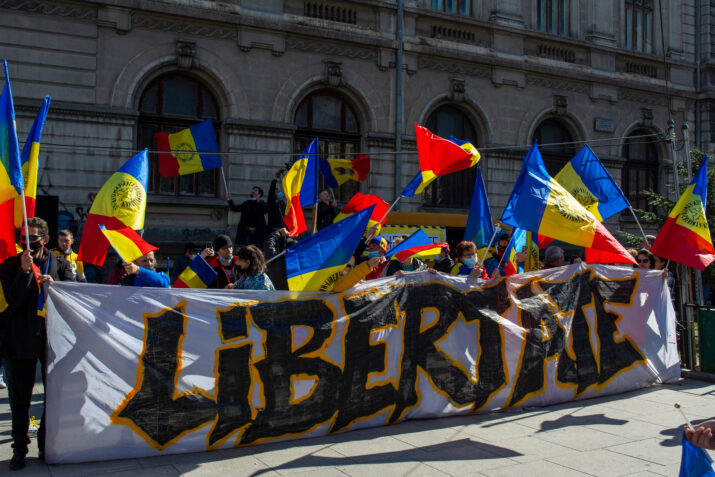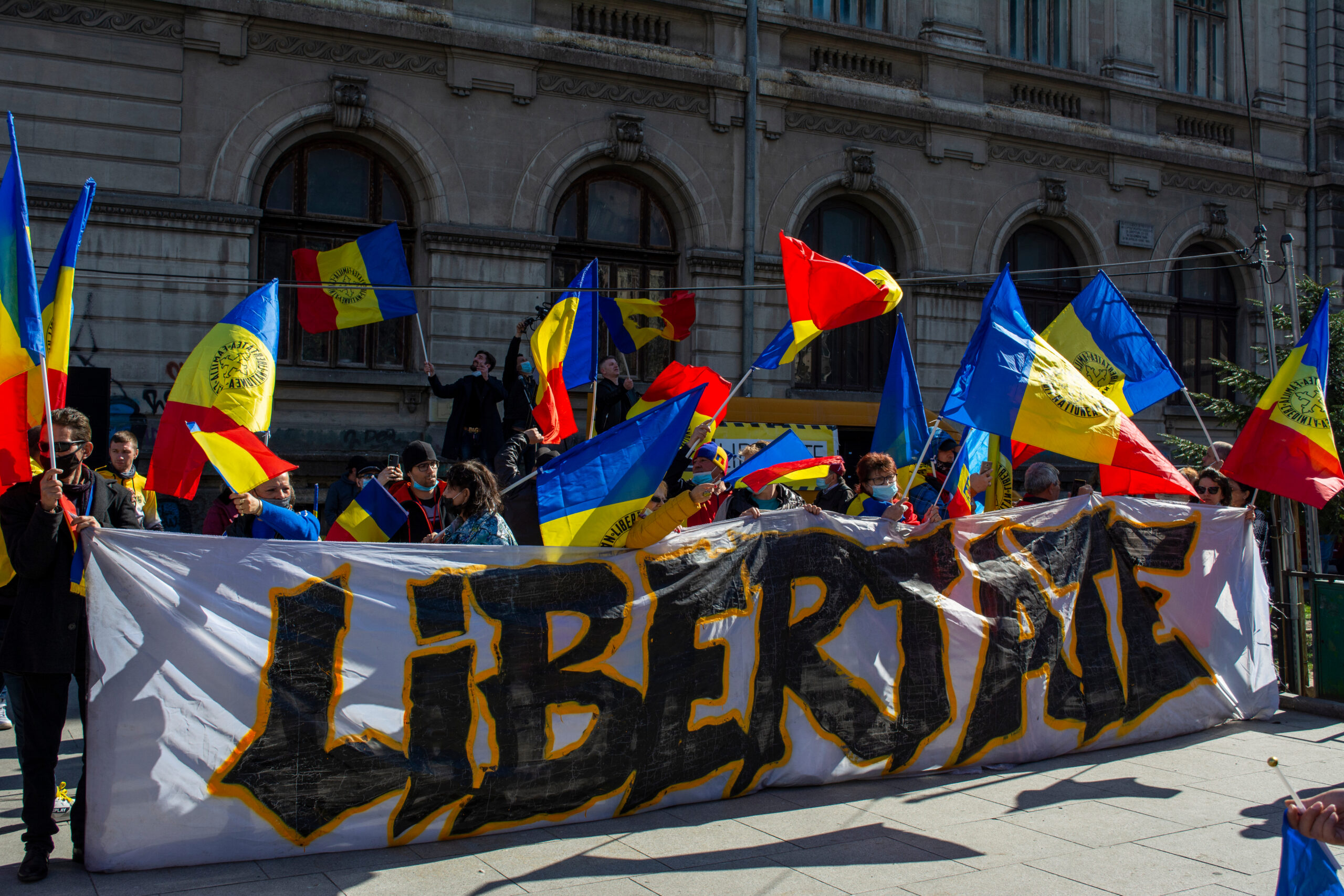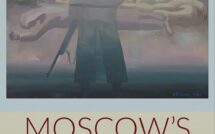

The COVID-19 pandemic challenged democratic governments and global governance alike. The rise of populism across the globe was a significant obstacle in coordinating a successful pandemic response within nations and globally. Romania provides an excellent example of how nationalist and populist messaging significantly threatened this response. As the pandemic affected the vulnerable population economically, socially, and culturally, the populist party Alliance for the Union of Romanians (AUR) rose to power following the December 2020 parliamentary elections, securing nine percent of the vote and becoming the fourth largest party in the Romanian parliament. AUR’s aggressive antisystem, antigovernment, anti-West, and extreme nationalistic discourse based on disinformation and misinformation denigrated pandemic safety measures such as the wearing of masks or social distancing and spread COVID-19 vaccine disinformation, slowing down progress in the fight against the disease, jeopardizing the government’s authority, and leading to people’s substantial distrust in medical expertise. AUR illustrates how populist movements persisted throughout the pandemic in Europe and could significantly affect democracy there. This paper discusses the effects of populism and nationalism on the pandemic response in Romania. It includes background information on the rise of AUR and its campaign, an assessment of the threat posed by AUR, an appraisal of the policy against fake news in Romania, and recommendations for the future implementation of policies to discourage populism and “infodemic.” The research contributes to the literature that examines the impact of populist and nationalist rhetoric on global health outcomes.
Background for the rise of AUR and its campaign
The COVID-19 pandemic created a unique situation that forced governments to exert extraordinary power to implement pandemic safety measures. Because these measures affected people’s everyday life, the rise of populist movements in this environment was unsurprising (Doiciar and Creţana 2021). In Romania, the restrictions imposed by the government when COVID-19 first broke out constituted a significant opportunity for populism to rise. AUR is a relatively new phenomenon on the Romanian political stage, and its success is a consequence of the COVID-19 pandemic. This new Romanian nationalist, populist party was well received by the population, as the latter was impacted by the pandemic and the safety measures put in place in the spring of 2020. AUR took advantage of this critical moment to win popularity based on its anti-government, anti-system, and anti-West populist discourse that blamed the elites for the pandemic and for the ensuing restrictions on people’s lives (Stoica 2021). While the rise of this populist movement in Romania was not an isolated case in Europe during the pandemic, AUR presents the peculiarity that it gained popularity based exclusively on an online campaign and presence—primarily via Facebook.
AUR’s success with the online medium came in an environment already saturated with disinformation (Bocancea 2020), as people in Romania are highly predisposed to the consumption of fake news for various reasons. First, the lack of trust in the government is substantial among those generations of people who were young during the communist regime of Nicolae Ceausescu or the first years following his administration’s fall. This segment of the population has been used to getting by without governmental help and believes that the government stands in the way; therefore, it has been reticent to accept governmental initiatives such as a COVID-19 vaccination mandate (Despa 2021). Second, deindustrialization has created a societal shock that affected another segment of the population—those who were relocated by the communist regime from villages to cities to work in the manufacturing sector and who eventually lost their jobs. These people have turned to irrational solutions to their problems and been usually more receptive to conspiracy theories (Despa 2021). Third, the lack of proper scientific education has persisted from communist to current times, leading to a lack of basic understanding of biology and the scientific method—a significant obstacle for the COVID-19 vaccination campaign in Romania.
Another important reason behind AUR’s success during the pandemic was the support the party received from the Romanian Orthodox Church. While the church has always strived to remain neutral in politics in support of the constitutional stipulation that separates church and state, the pandemic created a unique situation that led the traditionalist branch of the Orthodox Church to extend significant support to AUR in 2020 (Gherghina and Mișcoiu 2020). The church was deeply affected by the anti-clerical messaging promoted by mainstream Romanian political parties and propagated the belief that the European Union constituted a threat to traditional Romanian family and religious values; it further expressed its hope that AUR could defend these values and reinstate the church as an authority (ibid). The perception of anti-clerical messaging was deeply rooted in the COVID-19 pandemic restrictions imposed by the government, which impacted church’s activities such as gatherings, which were canceled. Thus, the Orthodox Church’s support for AUR was not motivated by religion per se but was rather a response to anti-pandemic measures that it perceived as being anti-clerical and the result of the spread of European liberal values within Romania (ibid). However, the church has never extended official support for the party, although influential church leaders have done so during gatherings or sermons.
In this context, AUR based its campaign on a religious nationalist discourse against so-called anti-religious elites described as being influenced by the European Union and acting against the most important traditional Romanian values, which have been defined as the four main pillars of the party’s doctrine: faith, family, freedom, and nationhood (Stoica 2021). The first of these four pillars—faith or religion—poses a particular threat to democracy. While religion, as a societal value, is not a new concept in Romania, it has recently become the root of social conflicts (Bocancea 2020).
AUR’s impact on the COVID-19 vaccination campaign
Romania was one of the European countries most affected by the pandemic in terms of the number of cases and deaths. Indeed, as of July 2023, Romania has had over 3.4 million confirmed cases, and over 68,000 people died of COVID-19 (World Health Organization, 2023, n.a.). It also had one of the lowest vaccination rates, with only 33 percent of the population vaccinated by October 2021, as opposed to the average vaccination rate of 72 percent for other member states of the European Union (Obreja 2022). The low vaccination rates have been primarily attributed to the spread of an unprecedented volume of disinformation and misinformation about COVID-19 vaccines, primarily produced on social media, with severe consequences on health behaviors and people’s lives (Scannell et al. 2021). While conspiracy theories on the topic were already circulating in 2020, AUR’s win in the December 2020 elections that placed the party in the Romanian Parliament with nine percent of the vote meant that such conspiracy theories were now validated at the political level. In addition, AUR pushed a narrative dominated by God rather than science, an approach Orthodox priests also supported. This narrative became one of the most successful anti-vaccination discourses, as AUR claimed that the vaccination drive constituted a betrayal of God and a violation of faith and free choice (Obreja 2022). Since AUR promoted such partisan narratives in the parliament, it was able to instill skepticism about the vaccination campaign among the population, which resulted in low vaccination rates and high death rates from COVID-19.
Fake news in Romania
To tackle fake news during the pandemic, the Romanian government shut down several websites spreading disinformation about COVID-19, including a website owned by an Orthodox Christian news platform (Barberá 2020). While seen as a violation of the freedom of the press by Reporters without Borders (Reporters sans frontières 2022) and an inefficient method to stop the spread of fake news, the government’s actions were legally justified by presidential decree in 2020 when a state of emergency was declared in the face of the pandemic. Article 54 of the decree stipulated that the government could take any necessary measures to prevent the dissemination of disinformation about the pandemic and that the National Authority for Management and Regulation of Communication could shut down any source of fake news (Official Gazette of Romania 2020).
However, while the government may have successfully implemented this method to shut down websites that spread disinformation, the same could not be said about social media. This explains AUR’s immense success in conducting a disinformation campaign, primarily on Facebook. In 2020, Facebook began eliminating from users’ accounts fake information about COVID-19 and vaccination that could discourage people from seeking medical treatment. Earlier in the pandemic, it had also targeted posts that advertised unconventional treatment or discouraged vaccination (Palade and Balaban 2020). Unfortunately, this feature was initially only implemented for posts produced in English. However, Facebook has been a popular social media platform in Romania, with approximately 12 million users out of a total population of 19 million Romanians (Stoica 2021). Once AUR was cut off from accessing traditional media by the government, it moved into the virtual domain, creating an environment known as the “social media nation” (Bocancea 2020, 23), which facilitated its accession to the Romanian parliament in 2020.
How to discourage populism and infodemic
In Romania, the government could counter populism by taking four measures: promoting media literacy, implementing regulatory measures, utilizing fact-checking tools, and encouraging and supporting quality journalism. These measures would empower citizens with the knowledge and skills needed to navigate the digital landscape. Through collaborative efforts, Romania could build resilience against misinformation and cultivate an information ecosystem that upholds democratic principles and promotes social cohesion.
Media literacy
The Romanian National Strategy of Defense of 2020 had already proposed the implementation of efficient educational tools to strengthen society’s resilience in overcoming vulnerability and to counter threats such as pandemics. Among these tools were the inclusion of critical thinking in the national educational curriculum to warn primarily about misinformation and the risks associated with consuming fake news; moreover, educational programs in digital competence and internet security were also promoted (Despa 2021). These ideas are yet to be implemented as of 2023. However, they highlight issues about the level of education among the population. It appears that Romania may have lost the battle against fake news and the infodemic during the COVID-19 pandemic. However, important lessons were learned that could help in a future crisis. Romania must include media literacy in its National Strategy of Defense to highlight the importance of media literacy. Educating the public on critically evaluating news is essential, as media literacy skills improve people’s ability to distinguish between credible and unreliable sources of information.
Regulatory measures
Combating populism through legislation could also be a useful measure for the government to take. The Romanian government could indeed introduce laws and regulations to penalize further those who spread fake news and hold social media platforms accountable for the content they host. A precedent exists in the European Union through the Digital Services Act (DSA) of 2022, a new European legislation intended to severely combat the spread of harmful information on social media. The Act requires that social media platforms remove illegal content as soon as it is posted and act against the user posting such content. Violating the Digital Services Act can result in expensive fines of up to six percent of a company’s revenue worldwide. Moreover, repeat offenders may be banned from conducting business in the European Union (TechHQ 2023). This type of legislation has constituted a breakthrough in combating fake news and a roadmap to follow to diminish the spread of disinformation. As a member of the European Union, Romania falls under the jurisdiction of the DSA, although there have been concerns about how it might violate the freedom of speech and expression. These reservations have limited the response against fake news in Romania and elsewhere. The primary collateral damage of the DSA may indeed be freedom of speech in Europe; however, this damage is difficult to estimate because the definition of “illegal content” varies across European countries. For example, in Hungary, unlike in other European countries, LGBT propaganda has been made illegal (Mchangama 2022). These variations challenge the stipulations of the DSA that require that “illegal” content be removed from online platforms. However, while imperfect, the Act constituted a start in facing the catastrophic consequences fake news had during the COVID-19 pandemic.
Fact-checking tools
A third measure that could reduce the spread of fake news is establishing independent fact-checking organizations that could quickly and accurately verify the authenticity of news stories. While most social media platforms have their own fact-checking tools and have used them—primarily in the US—to fact-check COVID-19 misinformation and disinformation, independent fact-checking organizations may render better and unbiased results. Several mass media organizations in Romania have already launched fact-checking projects to monitor political statements and validate their authenticity. In 2022, the company Meta, the owner of the social media platform Facebook, expanded its fact-checking program to Romania by partnering with The Factual, although there were delays because fact-checking mechanisms were not yet active in the Romanian language. The Factual is an online platform that scores news content by verifying the quality of its sources, journalists’ expertise, whether the news is opinion-based, and the outlet’s reputation (The Factual 2023). Facebook agreed to reduce the level of distribution of any content detected by The Factual as fake and to warn its users by marking that content as fake.
Support for quality journalism
An independent press is essential for a democracy to function properly. However, high-quality journalism has been challenged by disinformation trends. Any democratic government is responsible for encouraging and supporting quality journalism and independent media to fight fake news, an endeavor that can be supported by government funding, philanthropy, and media literacy initiatives. During crises such as the COVID-19 pandemic, the media must remain independent, professional, and capable of helping the public make sense of a complicated and fast-changing situation.
Democratic governments, including Romania’s, could further encourage and support quality journalism by ensuring and protecting the freedom of the press, allocating funding to support journalists, enacting institutional reforms to enable a suitable environment for the press, and offering solutions for independent journalism to have a sustainable future (Padania et al. 2021). Moreover, ensuring full transparency in the domestic ownership of the media could help news consumers determine any potential bias associated with commercial or political influence over information conveyed through a particular news outlet (Padania et al. 2021). In addition, social media content moderation, whether by social media owners, independent fact-checkers, or the government, should also be transparent. For example, moderators could clearly explain the procedure for content removal or flagging and make it possible for users to appeal removal decisions.
The case of AUR in Romania
The COVID-19 pandemic created a serious challenge for democratic governments, requiring coordinated and effective responses to protect public health and mitigate negative pandemic outcomes. However, the rise of nationalist and populist movements during the pandemic hindered governments’ efforts to implement successful pandemic responses. The case of the Alliance for the Union of Romanians (AUR) in Romania serves as a stark example of how nationalist and populist rhetoric can seriously threaten public health and democratic principles. AUR’s ascent to power during the initial COVID-19 outbreak demonstrated the potency of that party’s anti-system, anti-government, and extreme nationalistic messaging. AUR capitalized on people’s frustration with pandemic safety measures, spreading disinformation and misinformation about COVID-19 safety protocols and vaccines and hence slowing down the fight against the disease. AUR’s use of social media platforms as a primary means of information diffusion allowed its harmful narratives to gain widespread traction, which made it complicated for the government to implement a successful pandemic response.
In light of the lessons learned from the COVID-19 pandemic, it is essential for democratic governments such as Romania’s to take proactive measures to counter populism and infodemic. By fostering a well-informed and media-literate society, empowering independent journalism, and enacting appropriate regulations, democracies may safeguard public health and democratic principles. Failure to address these issues could have severe consequences, as the proliferation of fake news and populist narratives can undermine public trust in authorities and institutions and jeopardize public health. Therefore, concerted efforts by governments, civil society, and media organizations are required to confront these challenges and fortify the foundations of democracy and public health.
Andreea Mosila is a doctoral student in global security at the American Public University School of Security and Global Studies. Her research interests include the role of spacefaring in global security, non-traditional security threats in island nations, and the threat of climate change on global security.
References
Barberá, Marcel Gascón. 2020. “Romania’s Drive to Censor ‘Fake News’ Worries Activists.” Balkan Insight. https://balkaninsight.com/2020/04/27/romanias-drive-to-censor-fake-news-worries-activists/.
Bocancea, Sorin.2020. “Din Scârbă Și Infodemie: Alianța Pentru Unirea Românilor.” Polis (Bucharest, Romania) VIII (4(30)): 77–111. Știrile False Să Destabilizeze România.” Radio Europa Liberă România (RFE/RL). https://romania.europalibera.org/a/31566084.html
Doiciara, Claudia, and Remus Creţana. 2021. “Pandemic Populism: COVID-19 and the Rise of the Nationalist AUR Party in Romania.” Geographica Pannonnica 25 (4): 243–59. https://doi.org/10.5937/gp25-33782.
Gherghina, Sergiu, and Sergiu Mișcoiu. 2022. “Faith in a New Party: The Involvement of the Romanian Orthodox Church in the 2020 Election Campaign.” Politics, Religion & Ideology 23 (2): 226–42. https://doi.org/10.1080/21567689.2022.2080669.
Mchangama, Jacob. 2022. “Op-Ed: Don’t Be Too Tempted by Europe’s Plan to Fix Social Media.” Los Angeles Times (Online), 2022.
Obreja, Dragos, M. 2022. Narrative Communication Regarding the Covid-19 Vaccine: a Thematic Analysis of Comments on Romanian Official Facebook Page “RO Vaccinare.” SN Social Sciences. Vol. 2. https://doi.org/10.1007/s43545-022-00427-3.
Official Gazette of Romania. The President of Romania, Decree On the establishment of the state of emergency in the territory of Romania, Official Gazette of Romania, Part I, No. 212/16.03.2020.
Padania, Sameer, Emma Goodman, Louise Anglès-d’Auriac, Camille Grenier, Thibaut Bruttin, and Iris de Villars. 2021. “What Governments Can Do to Preserve the Press: A New Deal for Journalism.” Global Investigative Journalism Network. Reporters sans frontières. 2022. “Romania.” Retrieved from https://rsf.org/en/country/romania.
Scannell, Denise, Linda Desens, Marie Guadagno, Yolande Tra, Emily Acker, Kate Sheridan, Margo Rosner, Jennifer Mathieu, and Mike Fulk. 2021. “COVID-19 Vaccine Discourse on Twitter: A Content Analysis of Persuasion Techniques, Sentiment and Mis/Disinformation.” Journal of Health Communication 26 (7): 443–59. https://doi.org/10.1080/10810730.2021.1955050.
Stoica, Mihnea S. 2021. “Populist political advertising in times of pandemic: Framing elites as anti-religious.” Journal for the Study of Religions and Ideologies 20 (60): 115–27.
TechHQ. 2023. “The Digital Services Act – What You Need to Know.” https://techhq.com/2023/01/digital-services-act-what-you-need-to-know/#:~:text=Companies%20such%20as%20Google%2C%20Facebook,algorithms%20and%20how%20they%20work.
The Factual. 2023. “How It Works.” https://www.thefactual.com/how-it-works.
World Health Organization. 2023. Infodemic. World Health Organization. Retrieved from https://www.who.int/health-topics/infodemic#tab=tab_1
Published on November 21, 2023.




